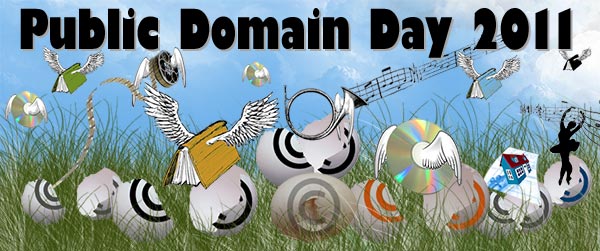Did you celebrate the New Year by reading Waiting for Godot on your Kindle for free? Or watching Disney’s 20,000 Leagues Under the Sea on Archive.org? If you live in the United States, most likely not, as these decades-old cultural artifacts remain shackled by copyright limitations, in spite of the law's original intent. Around the world, legacy media is enriching the commons, while in the United States the stranglehold only grows tighter, thanks in no small part to the whims of a certain capricious mouse. Countries around the world celebrate Public Domain Day on January 1st, the date at which legacy media enters the commons. But in the United States, not a single item entered the public domain on 1/1/11. Nor will it next year, or the year after.
It’s notable that outside of law and tech blogs, Public Domain Day came and passed without much media notice. Despite the work of activists like Lawrence Lessig and Kembrew McLeod, copyright law is an unsexy topic for those who don’t regularly peruse Boing Boing or consider the cultural and legal implications of Girl Talk’s music. But Public Domain Day presents an opportunity to reflect on the shared cultural history we are losing. Duke Law’s Center for the Study of the Public Domain frames the issue well:
In the United States, no publication will enter the public domain until 2019. And wherever in the world you live, you now have to wait a very long time for anything to reach the public domain. When the first copyright law was written in the United States, copyright lasted 14 years, renewable for another 14 years if the author wished. Jefferson or Madison could look at the books written by their contemporaries and confidently expect them to be in the public domain within a decade or two. Now? In the United States, as in most of the world, copyright lasts for the author’s lifetime, plus another 70 years. And we’ve changed the law so that every creative work is automatically copyrighted, even if the author does nothing. What do these laws mean to you? As you can read in our analysis here, they impose great (and in many cases entirely unnecessary) costs on creativity, on libraries and archives, on education and on scholarship. More broadly, they impose costs on our entire collective culture.
The endless horizon of copyright terms is robbing our shared cultural history and hindering the timeless creative process of building upon prior art in an age when the tools of creation and distribution are more accessible than ever. Few authors, musicians, filmmakers or other creators would deny the role prior art has played in refining their own aesthetic, and as Jonathan Lethem argued in his seminal Harper’s essay The Ecstasy of Plaigarism, great artists borrow more than inspiration from those who came before. Copyright law can be an imposing or intimidating subject for many, but the stakes are clear. For the neophytes, this Charlie Rose interview with Lessig serves as an excellent primer on what we’re losing and why it matters:









